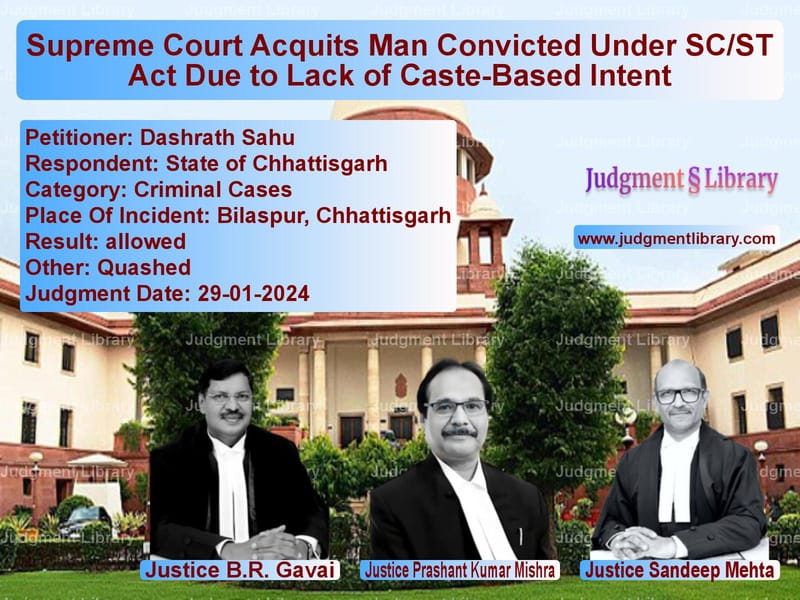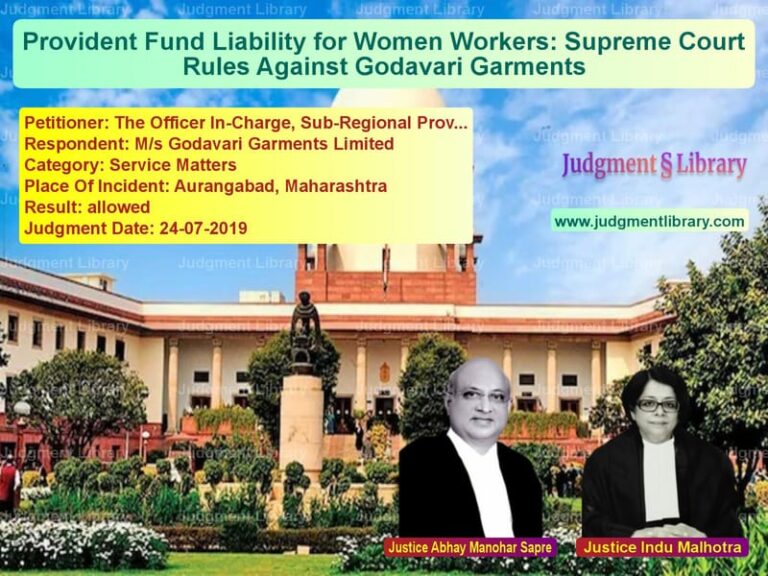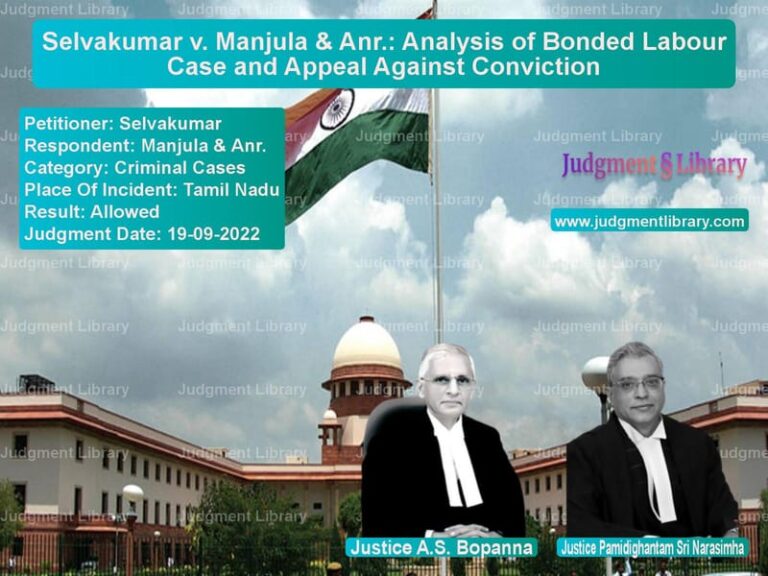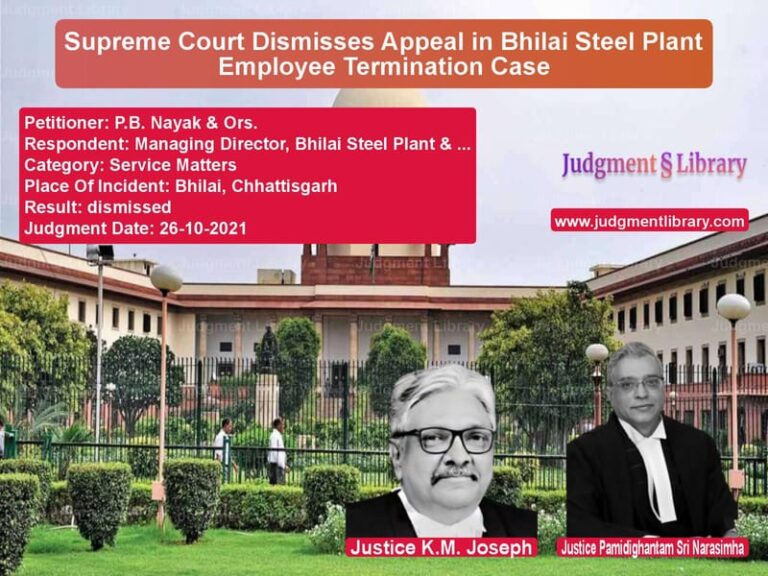Supreme Court Acquits Man Convicted Under SC/ST Act Due to Lack of Caste-Based Intent
The Supreme Court of India recently quashed the conviction of Dashrath Sahu under Section 3(1)(xi) of the Scheduled Castes and Scheduled Tribes (Prevention of Atrocities) Act, 1989 (SC/ST Act). The Court ruled that for an offense under this provision, there must be an intent to commit the act because of the victim’s caste status, which was absent in this case. The judgment reinforces the principle that mere allegations of misconduct do not automatically fall under the SC/ST Act unless there is evidence of caste-based discrimination.
Background of the Case
Dashrath Sahu was convicted by the Special Judge, SC/ST Act, Bilaspur, Chhattisgarh, for offenses under Sections 451 and 354 of the Indian Penal Code (IPC) and Section 3(1)(xi) of the SC/ST Act. He was sentenced to one year of simple imprisonment and a fine.
Read also: https://judgmentlibrary.com/supreme-court-acquits-murder-convict-due-to-lack-of-conclusive-evidence/
The case stemmed from allegations that the appellant, while the complainant was engaged in household chores at his house, attempted to outrage her modesty. The complainant later filed a case against him, leading to his conviction. However, during the appeal proceedings before the Chhattisgarh High Court, both parties reached a settlement. A joint application under Section 320 of the Code of Criminal Procedure (CrPC) was filed, seeking to quash the charges.
High Court’s Decision
The Chhattisgarh High Court partially accepted the compromise application, acquitting the appellant of charges under Sections 354 and 451 IPC. However, it rejected the plea concerning the offense under Section 3(1)(xi) of the SC/ST Act, stating that the provision was non-compoundable and mandated a minimum sentence of six months.
Petitioner’s Arguments
Dashrath Sahu challenged the High Court’s decision, contending that:
- There was no evidence that the alleged act was committed because the complainant belonged to the Scheduled Caste category.
- The case was purely a personal dispute and did not involve caste-based discrimination, as required under the SC/ST Act.
- The conviction under Section 3(1)(xi) should be set aside because there was no intent to commit the act based on the complainant’s caste.
- The parties had amicably settled their dispute, further reducing the justification for sustaining the conviction.
Respondent’s Arguments
The State of Chhattisgarh opposed the appeal, arguing that:
- The complainant belonged to a Scheduled Caste, and the SC/ST Act was applicable.
- The law mandated a minimum sentence under Section 3(1)(xi), preventing the court from allowing a compromise.
- The trial court had correctly convicted the appellant based on the evidence.
Supreme Court’s Observations and Ruling
The Supreme Court closely examined the evidence and legal provisions, emphasizing the importance of intent in SC/ST Act cases. The Court noted:
- Requirement of Caste-Based Intent: The Court observed that Section 3(1)(xi) requires that the offense be committed “on the ground” of the victim’s caste. The judgment stated:
- No Evidence of Caste-Based Discrimination: The Court reviewed the complainant’s testimony and found that the alleged act was not motivated by caste. Instead, the incident arose from a personal interaction, with no indication that the appellant targeted the complainant because of her Scheduled Caste status.
- Reference to Precedent: The Court cited the ruling in Masumsha Hasanasha Musalman v. State of Maharashtra (2000) 3 SCC 557, where it was held that offenses under the SC/ST Act require proof that the crime was committed due to the victim’s caste status.
- Misapplication of SC/ST Act: Since the prosecution failed to prove caste-based intent, the Court ruled that the conviction under Section 3(1)(xi) was “not sustainable on merits.”
“A plain reading of the section makes it clear that the offense of outraging the modesty should be committed with the intention that the victim belonged to the Scheduled Caste category.”
Final Judgment
The Supreme Court allowed the appeal and set aside the conviction under the SC/ST Act. It also discharged the appellant’s bail bonds, effectively ending the case against him. The judgment clarifies that:
- Offenses under the SC/ST Act cannot be presumed merely because the complainant belongs to a Scheduled Caste.
- Courts must examine whether caste-based discrimination was the motive before convicting under the SC/ST Act.
- Criminal cases should not be misused for personal disputes when there is no evidence of caste-based intent.
Impact of the Judgment
This ruling reinforces legal safeguards against the misuse of the SC/ST Act while ensuring that genuine cases of caste-based discrimination are prosecuted effectively. It provides a crucial precedent for cases involving allegations under the SC/ST Act, emphasizing the need for clear evidence of caste-based motivation.
Petitioner Name: Dashrath Sahu.Respondent Name: State of Chhattisgarh.Judgment By: Justice B.R. Gavai, Justice Prashant Kumar Mishra, Justice Sandeep Mehta.Place Of Incident: Bilaspur, Chhattisgarh.Judgment Date: 29-01-2024.
Don’t miss out on the full details! Download the complete judgment in PDF format below and gain valuable insights instantly!
Download Judgment: dashrath-sahu-vs-state-of-chhattisgar-supreme-court-of-india-judgment-dated-29-01-2024.pdf
Directly Download Judgment: Directly download this Judgment
See all petitions in SC/ST Act Case
See all petitions in Bail and Anticipatory Bail
See all petitions in Fraud and Forgery
See all petitions in Judgment by B R Gavai
See all petitions in Judgment by Prashant Kumar Mishra
See all petitions in Judgment by Sandeep Mehta
See all petitions in allowed
See all petitions in Quashed
See all petitions in supreme court of India judgments January 2024
See all petitions in 2024 judgments
See all posts in Criminal Cases Category
See all allowed petitions in Criminal Cases Category
See all Dismissed petitions in Criminal Cases Category
See all partially allowed petitions in Criminal Cases Category







